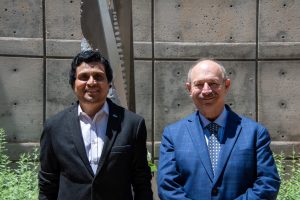Nobel laureate Bruce Beutler, M.D., visited the Oklahoma Medical Research Foundation last week.
Beutler, recognized as one of the world’s leading immunologists and geneticists, spoke to a packed auditorium of OMRF scientists about his pioneering work on the immune system.
Beutler is known for his studies of the innate immune system, which is the body’s first line of defense against foreign invaders like germs. The research that earned him the 2011 Nobel Prize in Physiology or Medicine ultimately led to the development of medications used to treat inflammatory diseases like rheumatoid arthritis and Crohn’s disease.
At OMRF, he discussed the numerous discoveries over decades that led to his most recent one involving genetic resistance to multiple cancers. Potentially, the single mutations responsible for this resistance may help scientists better understand who is likely to get cancer and perhaps identify new targets for drug discovery.
Beutler is director of the Center for the Genetics of Host Defense at the University of Texas Southwestern Medical Center in Dallas. He came to Oklahoma City at the invitation of OMRF scientist Jasim Ahamed, Ph.D., a cardiovascular biologist.

“I get a lot of requests to speak, but I don’t accept very many,” Beutler said after his talk. “I decided to do this one because I’ve always known about OMRF, and I have a lot of respect for the scientific work that goes on here.”
Following Beutler’s talk, he met privately with a group of OMRF graduate students and postdoctoral researchers. Beyond benefiting from the Nobelist’s scientific insights, the early-career researchers may have heard an even more impactful message about perseverance.
“As a young scientist, you’re often inclined to give up and move on if an experiment doesn’t go the way you planned after the first or second time,” said Ahamed. “Dr. Beutler’s lesson for all of us is that the most meaningful discoveries often come from what at first may seem like failure.”



